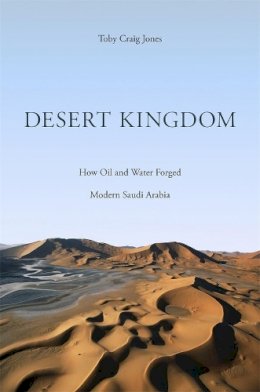17%OFF

Stock image for illustration purposes only - book cover, edition or condition may vary.
Desert Kingdom: How Oil and Water Forged Modern Saudi Arabia
Toby Craig Jones
€ 47.99
€ 39.89
FREE Delivery in Ireland
Description for Desert Kingdom: How Oil and Water Forged Modern Saudi Arabia
Hardback. Provides an alternative history of environmental power and the making of the modern Saudi state. This title demonstrates how vital the exploitation of nature and the roles of science and global experts were to the consolidation of political authority in the desert. Num Pages: 320 pages. BIC Classification: 1FB; 1FBX; HBJF1; JFFS. Category: (G) General (US: Trade). Dimension: 211 x 149 x 25. Weight in Grams: 518.
Oil and water, and the science and technology used to harness them, have long been at the heart of political authority in Saudi Arabia. Oil’s abundance, and the fantastic wealth it generated, has been a keystone in the political primacy of the kingdom’s ruling family. The other bedrock element was water, whose importance was measured by its dearth. Over much of the twentieth century, it was through efforts to control and manage oil and water that the modern state of Saudi Arabia emerged.
The central government’s power over water, space, and people expanded steadily over time, enabled by increasing ... Read more
Product Details
Publisher
Harvard University Press United States
Number of pages
320
Format
Hardback
Publication date
2010
Condition
New
Number of Pages
320
Place of Publication
Cambridge, Mass, United States
ISBN
9780674049857
SKU
V9780674049857
Shipping Time
Usually ships in 7 to 11 working days
Ref
99-11
About Toby Craig Jones
Toby Craig Jones is Associate Professor of History at Rutgers University, New Brunswick.
Reviews for Desert Kingdom: How Oil and Water Forged Modern Saudi Arabia
[A] provocative book...Desert Kingdom is a much needed addition to the small shelf of Saudi Arabian histories based on archival research and political economy rather than caricatures of oil wealth and the desert. The connection of geography to political power is compelling.
Frederick Deknatel
The Nation
For a desert kingdom to concern itself with the control of ... Read more
Frederick Deknatel
The Nation
For a desert kingdom to concern itself with the control of ... Read more
